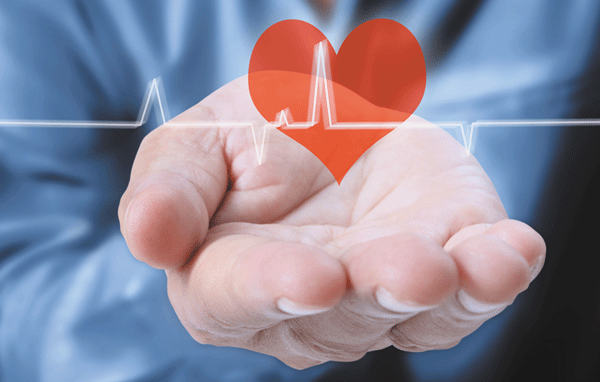
Counting steps is good — is combining steps and heart rate better?

Appendix pain: Could it be appendicitis?

Can saw palmetto treat an enlarged prostate?

How does Ozempic work? Understanding GLP-1s for diabetes, weight loss, and beyond

Zinc: What it does for the body, and the best food sources

Respiratory health harms often follow flooding: Taking these steps can help

Tips to leverage neuroplasticity to maintain cognitive fitness as you age

Can white noise really help you sleep better?

Celiac disease: Exploring four myths

What is prostatitis and how is it treated?
Heart Health Archive
Articles
Ask the doctor: Does heart rate affect blood pressure?
Q. When doctors interpret a blood pressure reading, should they also consider the heart rate? I am a 78-year-old man and have had high blood pressure (under control) for more than 40 years. I frequently monitor my blood pressure at home, resting for five minutes before I take the reading. My blood pressure is often higher when my heart rate is close to its usual resting rate (about 50 beats per minute) and lower when my heart is beating faster than that. Can the body's demands that cause higher blood pressure be partially satisfied by a faster heart rate?
A. First, let me congratulate you on monitoring your blood pressure at home. This is a great way for you to take control of your high blood pressure, and a good step toward preventing a stroke. Knowing that your blood pressure at home is under consistent control is more important than getting isolated readings at the doctor's office. You are also resting before taking the reading, and this is important to avoid spuriously high readings that happen when someone rushes around, and then sits down quickly to take a blood pressure reading. (Readers interested in monitoring their blood pressure at home can watch a video of how this is done at www.health.harvard.edu/128.)
Recovering from heart surgery
Here's what to expect once you're home from the hospital.
Every day, thousands of people in the United States undergo open-heart surgery. This major operation leaves them with a long chest incision — and a lengthy recovery. The time it takes to fully heal will depend on the person's age and overall health and the complexity of the operation.
The most common is coronary artery bypass grafting, which uses a blood vessel taken from another part of the body to bypass a blocked heart artery. Open-heart surgery is also done to repair or replace a faulty heart valve or to repair damaged or abnormal areas of the heart.
Treating heart attacks: Changes from Eisenhower’s era to the present day
In the 1950s, doctors offered mainly morphine and bed rest — a far cry from the many procedures and medications provided today.
During a round of golf one autumn afternoon in 1955, President Dwight Eisenhower experienced what he assumed was indigestion. After he awoke at 2 a.m. the following morning with severe chest pain, his personal physician administered several shots of morphine. It wasn't until 1 p.m. that afternoon that an electrocardiogram revealed that the president had experienced a heart attack.
Cardiologist Dr. Thomas Lee, professor of medicine at Harvard Medical School, detailed Eisenhower's experience in the Oct. 29, 2020, issue of The New England Journal of Medicine. His piece focuses mainly on how Eisenhower's cardiologist, Paul Dudley White, communicated the event to the public. As Dr. Lee wrote, "Heart attacks became less mysterious and frightening to millions of Americans that day."
What is heart rate variability?
Ask the doctor
Q. In last month's Heart Letter, you described some of the ways your heart rate reflects your health. But I've also heard about another measurement, called heart rate variability. Can you explain what that's all about?
A. Heart rate variability (HRV) is a sophisticated measurement of the variation in time between each heartbeat. We know that a heart rate that's too slow, too fast, or irregular can signal a problem, so it's only natural to think that a steady, regular pulse is a sign of a healthy heart. And you might also assume that having little or no difference in the time between each beat (that is, a low HRV) is best.
Put a song in your heart
Listening to music may offer a range of benefits for cardiovascular health.
Music's capacity to evoke emotion is one reason people love listening to it so much. Whether you want to feel energized and uplifted or calm and relaxed, you can probably conjure a few examples of melodies that put you in your desired frame of mind. As it turns out, those mood-related benefits may extend to your heart.
"The beating of your heart and your fight-or-flight system are regulated by your brain. Once you understand that, it makes sense that listening to music that evokes a certain mood might affect the heart's function," says Dr. Andrew Budson, a lecturer in neurology at Harvard Medical School and chief of cognitive and behavioral neurology at the VA Boston Healthcare System.
Can meditation help your heart?
People who practice this mind-calming technique may be less likely to have risk factors linked to heart disease.
Millions of Americans are using modern technology — via apps on their smartphones — to practice meditation, an ancient tradition that helps promote a sense of calm and relaxation. Last year's deluge of stress-inducing news was a boon for the meditation app business, which has evolved into a billion-dollar industry.
Growing evidence suggests that meditation may also improve factors linked to cardiovascular health. The latest comes from a Sept. 15, 2020, article in the American Journal of Cardiology. Researchers studied more than 61,000 people who took part in the two most recent National Health Interview Surveys (done in 2012 and 2017). Nearly 10% of the participants said they practiced some form of meditation. After adjusting for age, sex, sleep, depression, and other possible confounding factors, researchers found people who meditated had a lower prevalence of high cholesterol, diabetes, high blood pressure, stroke, and coronary artery disease compared with people who didn't meditate.
Eating foods that trigger inflammation may lead to cardiovascular disease
Research we're watching
Diets rich in foods that trigger chronic inflammation inside the body may raise your risk of developing cardiovascular disease. A study by a team of Harvard researchers, published Nov. 10, 2020, in the Journal of the American College of Cardiology, found that people who ate more inflammation-provoking foods, like sugary drinks, red and processed meat, and refined carbohydrates, were 38% more likely to develop cardiovascular disease than those who ate a diet that helped to combat chronic inflammation. Inflammation-inhibiting foods tend to have more fiber and antioxidants, such as leafy greens, fruit, whole grains, and tea and coffee.
To come to these conclusions, the study authors looked at data from more than 200,000 women and men from three large studies, the Nurses' Health Study I and II and the Health Professionals Follow-Up Study. The participants were followed, in some cases, for more than three decades. The authors said follow-up studies will be needed to confirm their results, but their findings suggest that developing anti-inflammatory diets may help to prevent cardiovascular disease.
Fruit of the month: Bananas
Bananas are one of the most popular fruits in the United States, perhaps because they're affordable (about 58 cents per pound, on average) and available year-round.
Among all fruits, bananas are one of best sources of potassium, with about 450 milligrams (mg) per banana. Healthy adults not on certain medications should aim for 4,700 mg of potassium daily, although few Americans meet this goal. A high potassium intake may help reduce high blood pressure and has also been linked to a lower risk of stroke and possibly heart disease.
Cohabitating couples share heart-related habits, risks
Research we're watching
Couples who live together tend to have similar health habits. But only about one in five couples falls into the "ideal" category for heart-healthy habits and risk factors, suggests a study in the Oct. 26, 2020, issue of JAMA Network Open.
Researchers looked at health data on 5,365 couples from diverse racial and economic backgrounds throughout the United States. Most were in their 40s and 50s. Based on risk factors from the American Heart Association's Life's Simple 7 (smoking status, body mass index, exercise, diet, total cholesterol, blood pressure, and fasting blood sugar), researchers categorized individuals and couples as poor, intermediate, or ideal for each factor and over all.

Counting steps is good — is combining steps and heart rate better?

Appendix pain: Could it be appendicitis?

Can saw palmetto treat an enlarged prostate?

How does Ozempic work? Understanding GLP-1s for diabetes, weight loss, and beyond

Zinc: What it does for the body, and the best food sources

Respiratory health harms often follow flooding: Taking these steps can help

Tips to leverage neuroplasticity to maintain cognitive fitness as you age

Can white noise really help you sleep better?

Celiac disease: Exploring four myths

What is prostatitis and how is it treated?
Free Healthbeat Signup
Get the latest in health news delivered to your inbox!
Sign Up











